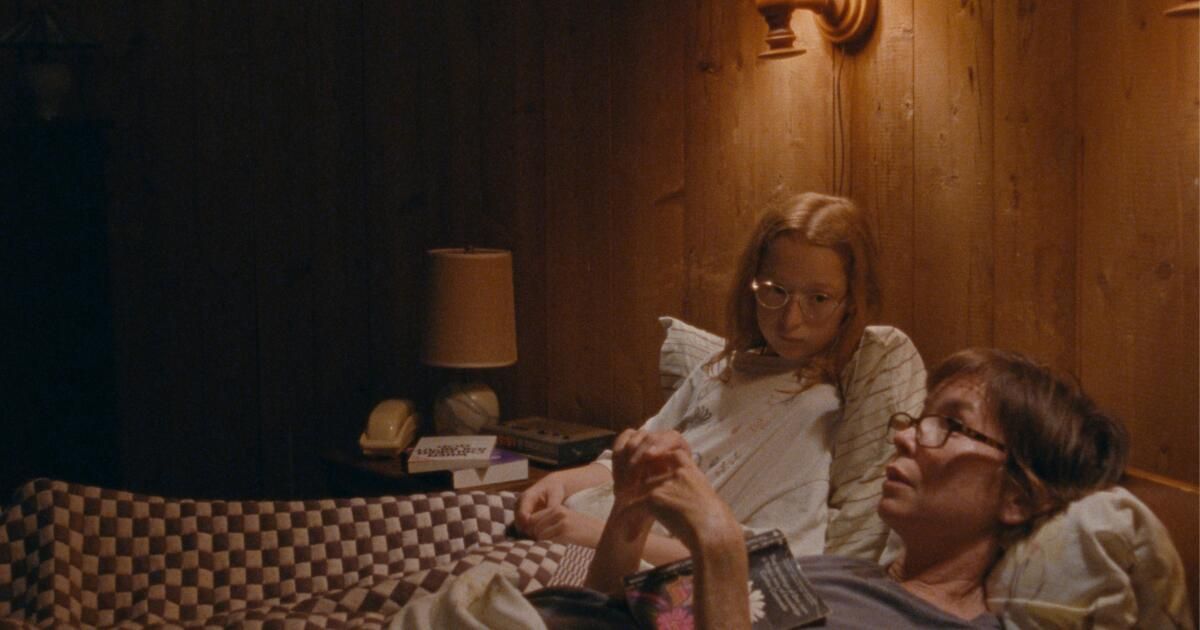“Janet Planet,” the stunning debut film from Annie Baker, one of the most wonderfully inventive playwrights of her generation, might strike some as exceptionally quiet. Dialogue is used sparingly, not to drive the narrative but to give it texture.
Listen closely, however, and you'll hear a concert of sound (wonderfully calibrated by designer Paul Hsu). Set in the wilds of western Massachusetts, familiar territory for Baker, who grew up in Amherst, “Janet Planet” is filled with the whispering trees and cricket orchestras of rural life.
The film takes place in the summer of 1991, and the heat and humidity are palpable. The fans move uselessly, trying to relieve the oppressive closeness. A heavy languor has fallen over the house where 11-year-old Lacy (Zoe Ziegler) lives with her mother, Janet (Julianne Nicholson), a licensed acupuncturist with a history of ill-advised relationships. (Production designer Teresa Mastropierro conjures a crunchy world that's still in touch with the ghost of Woodstock.)
When the film begins in the middle of the night, Lacy is at the camp and sneaks to a pay phone to tell her mother that if she doesn't pick her up she will kill herself. Blackmail works. Janet quickly arrives with her war veteran boyfriend, Wayne (Will Patton), who doesn't seem too happy about the change in summer plans. But Wayne, pathologically uncommunicative, never seems very happy about anything.
“Janet Planet” is about the intense bond between a permissive, eager-to-please mother and an iron-willed preteen daughter. It is a kind of love story, whose happy ending depends on a breakup. Lacy finds herself in a series of triangles with her mother, whose attention she would like to monopolize. However, her future depends on how successful she can be in moving beyond what Freud called family romance.
The title may be “Janet Planet,” but it is Lacy's film. Baker follows the girl's inner growth with the patient gaze of a horticulturist. The camera never tries to extract more from Lacy than is true at the moment. Rarely has childhood seemed so inflexible.
There is certainly nothing accommodating about the bespectacled presence of Ziegler's Lacy, who is herself stubborn and sullen. Unlike Janet, an earth mother who exerts a gravitational pull on others, Lacy is too immersed in the enigma of her own life to care about her effect on those around her.
Growing up is a slow process, full of false starts and without any timetable. Baker, whose 2013 Pulitzer Prize-winning play “The Flick” focused on the incidental conversations of employees at a doomed arthouse movie theater in Worcester County, Massachusetts, is not prone to rushing things. In “Janet Planet,” the air itself seems to vibrate with open time.
Smartphones and the Internet are still a few years away, so Lacy has more opportunities to benefit from the gift of tedium. Her imagination rushes to fill the space that external distraction has not yet claimed.
Baker focuses on the prosaic: blintzes cooking in the microwave, the kitsch comforts of the home of Lacy's methodical piano teacher. A trip to a department store to meet Wayne's young daughter, Sequoia (Edie Moon Kearns), turns into a tour through a wonderland of merchandise shelves and fast food stands.
Lacy has an annoying way of making himself known, of marking territory with any means at his disposal. In the first section of the film dedicated to Wayne (the film is divided into chapters named after Janet's various companions), Lacy practices maddeningly repetitive exercises on her simple electronic keyboard. It's her way of letting the adults know that she's not going anywhere.
Julianne Nicholson, left, and Zoe Ziegler in the movie “Janet Planet.”
(A24)
In the middle section of the film revolving around Regina (Sophie Okonedo), an old theater friend of Janet's who becomes a roommate after Wayne is fired, Lacy becomes intoxicated by the exotic shampoo that has come into her life. the bathroom repertoire. She lavishes this ambrosia on her own head, leaving strands of her fragrant hair on the shower wall to make sure Regina notices this little theft. Or perhaps as a way to leave parts of herself to her mother, who one night tore some strands from her head to comfort Lacy for not sleeping with her all night.
When Avi (Elias Koteas), the director of the experimental puppet troupe from which Regina has fled, courts Janet, Lacy is more willing to be left alone. Alone in her room with her set of makeshift miniature dolls, she lets herself be carried away by the whim of her imagination. Progress doesn't come in leaps and bounds, but there are flashes of movement on Lacy's inner growth chart.
As a playwright, Baker wants audiences to become aware of their own habits of attention and inattention. The leisurely pace of his work can be challenging on stage. But in a movie, where such laziness might be even less welcome, the effect is curiously hypnotic. The plot is not used as bait. Some drift is accepted. Non sequitur coexists with linear logic. The unusual, the strange and the incongruous are crucial parts of the Baker universe. Out of nowhere, a crazy outdoor puppet theater production appears by a company that operates like a New Age cult.
The scene is not in vain: Janet reunites with Regina after attending a presentation of the company's latest metaphysical love with a wide-eyed Lacy in tow. Avi, the theatrical ringleader, follows in Regina's wake. What may seem disjointed to the point of being random, actually has a purpose.
Baker asserts an intuitive control over what could be described as psychological music. She closely follows the magnetism and friction of her characters. At play are those subtle changes in relationships that can be the catalyst for metamorphosis. Change is an interactive phenomenon. The self gains sharper clarity through the encounter with difference.
We are invited to glimpse reality through Lacy's perfectly normal solipsism. Baker and cinematographer Maria von Hausswolff alter perception with subjective camerawork. When Janet is in bed with Wayne, Lacy wonders about a set of limbs. Janet's freckled legs later appear when Lacy takes refuge on the floor from the adults' control.
Sometimes the disorienting perspective is applied more universally. Sometimes Lacy is shot in such a way that we cannot immediately be sure of her identity or her exact whereabouts. When Janet and Regina take ecstasy at home and come into conflict, the camera captures their faces in puzzle configurations that reflect their mismatched reality.
Baker does not explain his images any more than he explains the meaning of his dialogue. She asks us to free ourselves from what we think we understand so we can surrender to the curiosity before us.
The film enjoys the idiosyncrasies of the cast. Nicholson's unadorned beauty, as ready to be discovered as a remote landscape, permeates the film as much as Ziegler's moody aura. The wild stillness of Patton's Wayne occasionally reveals a streak of whimsical eccentricity that intensifies the sense of menace. The smoky tone of Okonedo's voice endows Regina with a regal confidence, despite her mercurial circumstances. Koteas's Avi, who presents himself as a college professor messiah, brings a self-satisfied masculinity to the character's mystical enthusiasm.
As is often the case in Baker's work, there is some tension over how the drama will move from plotless reverie to resolution. Here, the question becomes part of the viewing experience: How can a film that's so much about the experience of time conclude resonantly without feeling overhandled or unsatisfyingly abrupt?
There are moments when Baker herself seems eager to know how to proceed, moments when the film becomes overly explanatory, such as when Janet out of nowhere mentions her “Holocaust survivor father and angry mother,” or stylistically confusing, like when they introduce themselves to the men in the movie. like quasi ghosts.
No matter: the real story is between Janet and Lacy and how they will resolve their tangled identities. After Lacy harasses a sick Wayne into a violent fit, Janet asks her daughter what she should do. Lacy calmly tells him that she will have to break up with him. Janet follows this wise advice, but no one can tell Lacy how to grow up.
That's something only time can teach you. Fortunately, Lacy, like his playwright-turned-filmmaker, is a quick learner. “Janet Planet” is a brilliant debut for Baker, who doesn't translate his artistry to the screen but instead discovers a whole new frontier for his unique sensibility.
'Planet Janet'
Classification: PG-13, for brief, strong language, some drug use and thematic elements.
Execution time: 1 hour, 53 minutes
Playing: In limited release on Friday, June 28.












